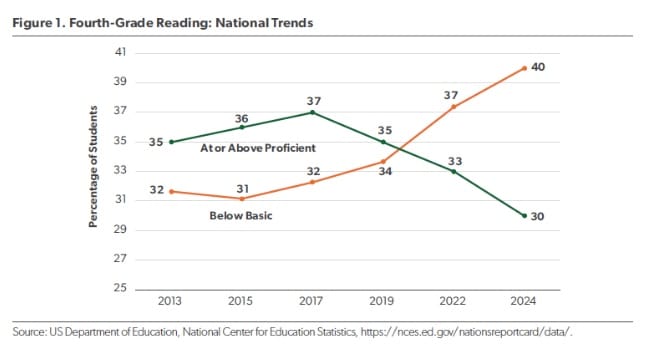March 12 2025
Trump deploying AI to federal workforce; standardized test scores drop sharply; GOP funds govt thru Sep; Ukraine supports cease-fire; China’s sea mapping worries allies

Trump Admin Tests AI Chatbot to Boost Federal Efficiency at GSA
2024 National Standardized Education Scores Reveal Alarming Decline in Basic Student Skills
House GOP Passes Funding Bill with Trump’s Backing, Dems Balk
Ukraine Backs Trump’s 30-Day Cease-Fire Plan After Saudi Talks, Ball in Russian Court
China’s Ocean Mapping Fleet Raises Military Concerns for U.S. Allies
GET THE CITIZEN JOURNAL APP - FREE!

1. Trump Admin Tests AI Chatbot to Boost Federal Efficiency at GSA
A new phase of the president and the Department of Government Efficiency’s attempts to downsize and remake the civil service is under way. The idea is simple: use generative AI to automate work that was previously done by people. The Trump administration is testing a new chatbot with 1,500 federal employees at the General Services Administration and may release it to the entire agency as soon as this Friday—meaning it could be used by more than 10,000 workers who are responsible for more than $100 billion in contracts and services….The bot, which GSA leadership is framing as a productivity booster for federal workers, is part of a broader playbook from DOGE and its allies. Speaking about GSA’s broader plans, Thomas Shedd, a former Tesla engineer who was recently installed as the director of the Technology Transformation Services (TTS), GSA’s IT division, said at an all-hands meeting last month that the agency is pushing for an “AI-first strategy.”
Source: Atlantic
2. 2024 National Standardized Education Scores Reveal Alarming Decline in Basic Student Skills
The 2024 NAEP [National Assessment of Educational Progress] scores underline a continuing decline in educational achievement in the United States. For years following the No Child Left Behind Act of 2001, the nation focused on the noble but unattainable goal of bringing all our students up to NAEP’s proficiency level. This two-decades-long focus on proficiency hid one of the most damaging—and worsening—trends in American education: the growing number of students who don’t even meet NAEP’s “basic” level of performance. To fully grasp the seriousness of the 2024 results, it is important to understand what we mean when we say “proficient” and “basic.”2 According to the National Assessment Governing Board (NAGB), which sets policy for NAEP, “Students reaching [proficiency] have demonstrated competency over challenging subject matter, including subject-matter knowledge, application of such knowledge to real world situations, and analytical skills appropriate to the subject matter.”3 For example, fourth-grade students who reach the proficient level in reading can describe the impact of a character’s actions or explain how characters influence one another. Basic denotes partial mastery of the knowledge and skills that are fundamental for proficient work at each grade.4 For example, students at the basic level in fourth grade should be able to sequence or categorize events from a literary text (e.g., event A occurs before event B). Students who cannot perform such skills are classified as “below basic.”

Source: AEI
3. House GOP Passes Funding Bill with Trump’s Backing, Dems Balk
House Republicans have been incapable of passing a government funding bill without Democratic help since clinching the majority in 2022. That changed Tuesday — thanks, in part, to President Donald Trump. The House approved a GOP proposal that would keep the federal government running through the end of September if the Senate adopts it before a 12:01 a.m. Saturday funding deadline. All but one House Republican voted for the bill, which passed 217-213. With one exception, House Democrats rejected the continuing resolution, known as a CR, due to their opposition to cuts in government spending pushed by Trump and billionaire adviser Elon Musk through his U.S. DOGE Service. The bill trims spending from fiscal 2024 by $13 billion in nondefense spending over the rest of the fiscal year and increases defense funding by $6 billion in an attempt to assuage hawks.
Source: Washington Post
4. Ukraine Backs Trump’s 30-Day Cease-Fire Plan After Saudi Talks, Ball in Russian Court
Ukraine said it would support a Trump administration proposal for a 30-day cease-fire with Russia, an announcement that followed hours of meetings on Tuesday in Saudi Arabia, where the United States agreed to immediately lift a pause on intelligence sharing with Kyiv and resume military assistance. The talks in the coastal city of Jeddah, Saudi Arabia, brought new momentum to cease-fire negotiations that had faltered after a public confrontation at the White House between the Ukrainian and U.S. presidents. The Trump administration had suspended all military aid and intelligence sharing in the aftermath of that combative meeting in Washington. The announcements on Tuesday, in a joint statement, came hours after Russian officials said Ukrainian drones had targeted Moscow in the largest attack of the war on the Russian capital. In the statement, the United States and Ukraine acknowledged that the terms of any cease-fire would be subject to Russia’s approval. There was no immediate comment on the cease-fire discussion from Moscow, which had no officials at the talks.
Source: NYT
5. China’s Ocean Mapping Fleet Raises Military Concerns for U.S. Allies
China is rapidly expanding ocean exploration in waters far beyond its shores, sending out a fleet of vessels whose research offers Beijing valuable military intelligence as it expands its naval reach and menaces U.S. allies. China’s fleet has triggered protests from Japan, India and others, but that hasn’t stopped Beijing from launching long missions to map the sea floor. The data they obtain has numerous applications, from science to the emerging industry of deep-sea mining, but it is the Chinese government’s commandeering of civilian research for military use that threatens American allies. “If that data may have some value to the Chinese military and they want access to it, they’re going to get it,” said Matthew Funaiole, senior fellow in the China Power Project at the Center for Strategic and International Studies. “There’s no firewall in place.”

Source: WSJ
March 12, 1933: FDR broadcasts first ‘fireside chat’ during the Great Depression
SUBSCRIBE ONLINE TO GET THE US CITIZEN JOURNAL IN YOUR INBOX - FREE!
See the Ad Astra Podcast! Released on Apple and Spotify around 10a CST.
Sponsors (click me!)










Sources
- https://www.theatlantic.com/technology/archive/2025/03/gsa-chat-doge-ai/681987/
- https://www.aei.org/research-products/report/many-children-left-behind-the-2024-national-assessment-of-educational-progress-results-indicate-a-five-alarm-fire/
- https://www.washingtonpost.com/politics/2025/03/11/government-shutdown-trump-republicans-house/
- https://www.nytimes.com/2025/03/11/world/europe/ukraine-us-saudi-cease-fire-talks.html
- https://www.wsj.com/world/asia/china-is-mapping-the-seabed-to-unlock-a-new-edge-in-warfare-c8ac5180?mod=wknd_pos1
